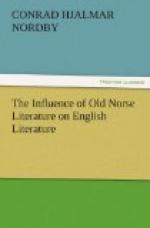CHARLES KINGSLEY (1819-1875).
In 1874, Charles Kingsley visited America and delivered some lectures. Among these was one entitled “The First Discovery of America.” This interests us here because it displays an appreciation, if not a deep knowledge, of Icelandic literature. In it the lecturer commended to Longfellow’s attention a ballad sung in the Faroes, begging him to translate it some day, “as none but he can translate it.” “It is so sad, that no tenderness less exquisite than his can prevent its being painful; and at least in its denouement, so naive, that no purity less exquisite than his can prevent its being dreadful."[24] Later in the lecture he commends to his hearers the Heimskringla of Snorri Sturluson, the “Homer of the North."[25]
Speaking of the elements that mingled to produce the British character, Kingsley says: “In manners as well as in religion, the Norse were humanized and civilized by their contact with the Celts, both in Scotland and in Ireland. Both peoples had valor, intellect, imagination: but the Celt had that which the burly, angular Norse character, however deep and stately, and however humorous, wanted; namely, music of nature, tenderness, grace, rapidity, playfulness; just the qualities, combining with the Scandinavian (and in Scotland with the Angle) elements of character which have produced, in Ireland and in Scotland, two schools of lyric poetry second to none in the world."[26] Over the page, Kingsley has this to say: “For they were a sad people, those old Norse forefathers of ours."[27] Humorous and sad are not inconsistent words in these sentences; the Norseman had a sense of the ludicrous, and could jest grimly in the face of death. Of the sadness of his life, no one needs to be told who has read a saga or two. Kingsley says: “There is, in the old sagas, none of that enjoyment of life which shines out everywhere in Greek poetry, even through its deepest tragedies. Not in complacency with Nature’s beauty, but in the fierce struggle with her wrath, does the Norseman feel pleasure."[28]
This lecture shows a deeper acquaintance with Old Norse literature than Kingsley was willing to acknowledge. Not only are the stories well chosen which he uses throughout, but the intuitions are sound, and the inferences based upon them. He anticipated the work of this investigation in the last words of the address. He has been telling the fine story of Thormod at Sticklestead:
“I shall not insult your intelligence by any comment or even epithet of my own. I shall but ask you, Was not this man your kinsman? Does not the story sound, allowing for all change of manners as well as of time and place, like a scene out of your own Bret Harte or Colonel John Hay’s writings; a scene of the dry humor, the rough heroism of your own far West? Yes, as long as you have your Jem Bludsos and Tom Flynns of Virginia City, the old Norse blood is surely not extinct, the old Norse spirit is not dead."[29]




